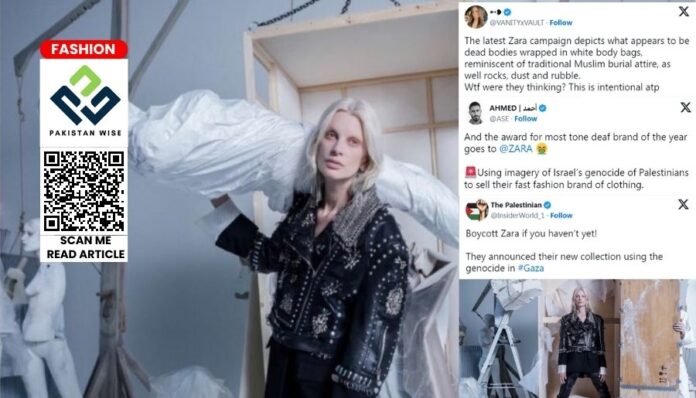In the realm of fashion, where creativity often meets controversy, Zara, the renowned Spanish retailer, finds itself embroiled in a storm of criticism. The brand’s recent advertising campaign has sparked widespread outrage and accusations of insensitivity.
ZARA ATELIER. Collection 04_The Jacket
— ZARA (@ZARA) December 7, 2023
A limited edition collection from the house celebrating our commitment to craftsmanship and passion for artistic expression. https://t.co/EiUO0avB4w pic.twitter.com/Mz2x6pH7ho
Zara’s latest Atelier collection launch featuring American model Kristen McMenamy took an unexpected turn as it unveiled images that struck a chord with the public, but not in a positive way. The campaign, touted as a celebration of craftsmanship and artistic expression, portrayed McMenamy amidst mannequins draped in white shrouds, amidst debris and rubble, reminiscent of a scene of devastation.

The controversy escalated when certain images from the campaign drew parallels with the distressing realities faced by Palestinians under the Israeli occupation. The most contentious photograph, now removed from Zara’s social media, depicted McMenamy holding what appeared to be a figure shrouded in white sheets, evoking imagery associated with traditional Muslim burial practices.
Internet users swiftly reacted, accusing Zara of exploiting the plight of Palestinians and insinuating a connection between the campaign and Israel’s actions in Gaza and the West Bank. Calls for a boycott gained momentum, with individuals expressing their dismay and discontent with the fashion label’s alleged insensitivity.

However, Zara has not issued an official statement addressing these claims, leaving the public to speculate on the intent behind the campaign’s imagery and timing. This silence has only added fuel to the fire, with many condemning the brand’s lack of accountability and sensitivity towards global issues.
Amidst the uproar, questions arise regarding the responsibilities that brands hold in their portrayal of social and political contexts. The fine line between artistic expression and societal insensitivity has been blurred, prompting a reevaluation of the ethical considerations within the fashion industry.

This is not the first time Zara has faced accusations of insensitivity or controversy. Past incidents have led to boycott calls and criticism, suggesting a recurring pattern that has now stirred a heated conversation about the brand’s actions and allegiances.
As the controversy rages on, the public discourse highlights the significance of ethical advertising, emphasizing the need for brands to navigate sensitively through societal issues, ensuring their campaigns neither exploit nor trivialize real-world hardships.
The call for accountability continues, urging Zara and other brands to reflect on their messaging and the potential impact it has on global conversations, reminding us all that fashion isn’t just about trends—it’s also about responsibility.

